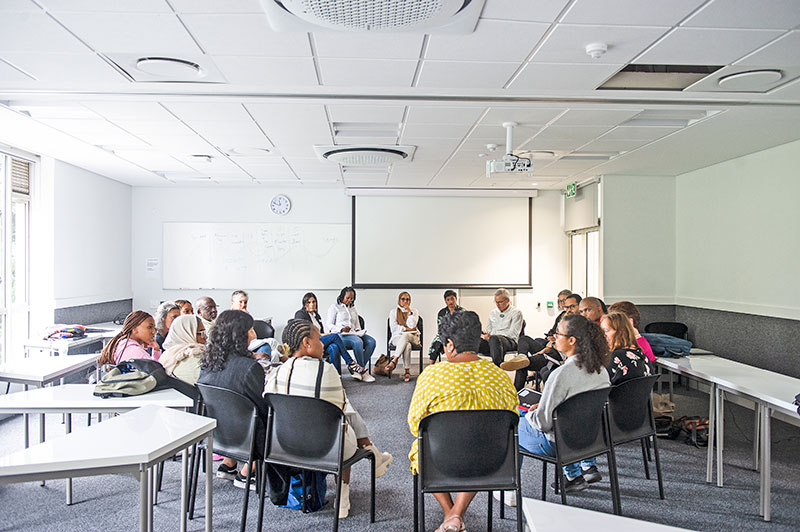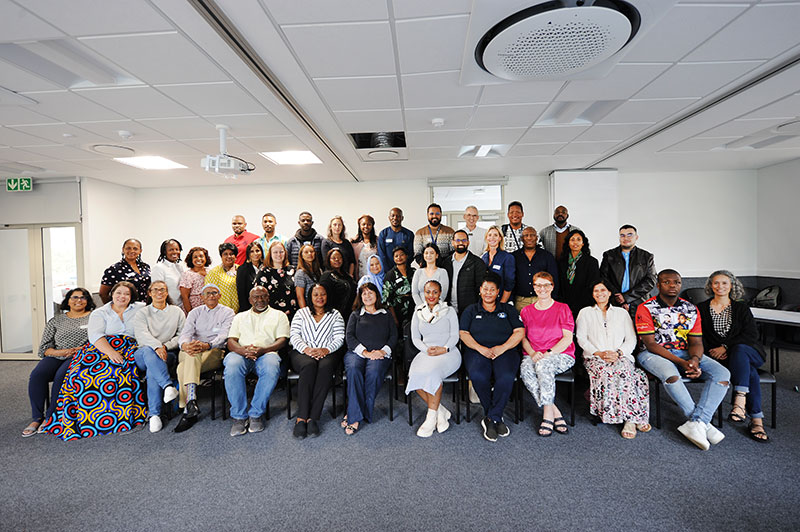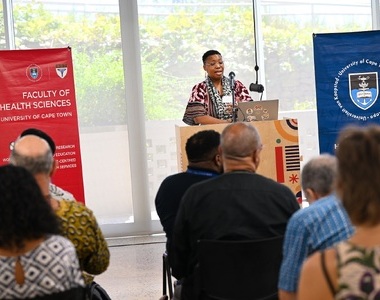What an integrated student journey should look like: Indaba revisits foundations
13 April 2023 | Story Helen Swingler. Photos Lerato Maduna. Read time 9 min.
How does the University of Cape Town (UCT) become a community to students, long before they enrol? And how can the university maintain a holistic and integrated student experience at every stage of their journey – from recruitment to admission and graduation?
These were central questions at UCT’s first Integrated Student Success (ISS) Indaba on 23 March, held in the Neville Alexander Building. The indaba drew stakeholders from across the student experience ecosystem, a collaboration between the acting deputy vice-chancellor for Teaching and Learning, Professor Harsha Kathard; the dean of the Centre for Higher Education Development, Associate Professor Kasturi Behari-Leak; the executive director of the Department of Student Affairs, Pura Mgolombane; and the deputy registrar, Mihloti Mkhatshwa.

The indaba aimed to understand the ‘as is’ reality of the student journey at UCT and establish a foundation for ‘what could / should/ must be’. The focus was on the student journey in Term 1 at UCT, aiming to understand which processes and interventions worked or didn’t, why they may not have worked and what can be done better in Term 2 to strengthen these systems and processes.
The indaba stemmed from the Integrated Student Success Working Group (ISSWG), constituted across various stakeholders and partnerships (academic, and professional, administrative support and service staff) who are involved in enabling student success at UCT.
The ISSWG concept note reports: “While the academic project is firmly rooted in the university classroom, various levels of scaffolding are needed in the broader university ecosystem to positively influence the student journey at every stage. The goal of the ISSWG is thus to harness and consolidate all efforts into a professional and productive service that is fully integrated.”
Humanising experience
For some, the UCT student experience can be a dehumanising experience, fraught with bottlenecks and a lack of integration between services, said Mgolombane.
Addressing these issues is essential to the student journey, as the ISSWG concept note states.
“Humanising pedagogy is ascribed to Paul Freire who contends that our need to humanise our experiences arise out of historic imbalances that have sometimes been inhumane. The student experience also needs our humanity, through our individual and collective consciousness in reorganising the ‘other’ as a human being first, before any societal, political and economic markers.”
“The student experience must rest on a humanising approach that places them at the heart of systems and processes.”
Mgolombane added: “The student experience must rest on a humanising approach that places them at the heart of systems and processes. Developing the values of empathy, care and compassion will help us to humanise this space within in the university.”
As such, the inclusion of students’ voices is essential, said Professor Kathard.
“This approach then becomes an act of social responsiveness,” she added.
Mgolombane emphasised the importance of sound communication between the student experience stakeholder groups.
“We must identify who does what, [and] identify the ‘painful areas’ within the faculties. This will help us to recognise and address issues early before there is a crisis. For example, identifying students at risk looking at alternatives and choosing the right option at the right time.”
Creating solid networks and sustainable relationships within the student ecosystem is vital to this process, he said. “If you can’t help a student, identify the next person who can, call them and say, ‘Here’s what they need. Can you help?’”
From ideas to solutions and integration
The indaba took the form of four interlinking sessions.
First, Conversation Circles with Associate Professor Behari-Leak mapped the student experience to understand UCT’s context and the constraints or enablers within the student ecosystem: what has or hasn’t worked in previous interventions.
This was followed by a Knowledge Café, small group discussions led by Mkhatshwa. Each cluster generated ideas to overcome specific challenges and identify the support needed across the system.
The third session, World Café, was led by Mgolombane. These were inter-cluster engagements; each group sharing similar challenges and successes while using critical reflexivity and humanising principles to address the obstacles. (Critical reflexivity is the capacity to see one's own perspective and assumptions and understand how one's perspective, assumptions and identity are socially constructed through critical reflection.)
The last session, Towards Integration, was led by Kathard and discussed the strategies, resources and processes needed to consolidate the system in the future.
Proactive, constructive communication
During the open mic session at the end of proceedings, Tatiana Sango of the Centre for Educational Assessments called for proactive and constructive communications with prospective students at an early stage to get them ready for university.
What is envisaged is building a community that begins with prospective students at school level and supported by platforms for learning that support the development of their critical skills.
“So, let’s connect with them and tell them what we want them to know.”
“In other words, what do we want them to know by the time they come to UCT? And why don’t we tell them? If I’m teaching mathematics to first-years, I want them to grasp X, Y and Z. So perhaps I need to create an open course and introduce that to Grade 9s across the country. They can start building from there. So, let’s connect with them and tell them what we want them to know. Then, let’s bring them up to date before we have a problem.”
Noni Falala of the International Academic Programmes Office spoke about bottlenecks for international students.
“We must get the message out there that students can apply in April; they don’t have to wait until October or November. That way we can start making conditional offers and they can begin visa processes.”

The Faculty of Health Sciences’ Dr Kerrin Begg described how early support is achieved.
The deputy director of the Academic Development Programme, Dr Riashna Sithaldeen, drew attention to existing mechanisms to help students, primarily the UCT Central Advising and Referral System (UCT_CARES). This is the central point of contact for the information and services students and staff need. There are faculty-specific UCT_CARES services – each with their own helpdesk.
The challenge now is to develop a mechanism to get feedback from those who refer the students, indicating whether the students get the help they need.
Gcinumzi Haduse, the director of admissions, suggested easing the onerous National Benchmark Test (NBT) process.
“UCT is the centre of the NBTs. Why can’t we open online sessions [to familiarise students with the test and its requirements]?”
Dr Memory Muturiki, the director of the Student Wellness Service, said that although UCT recruits the best students in the country, many fail for the first time at UCT. It is essential to support them to ensure they can bounce back.
Start early
In her concluding remarks, Kathard emphasised the importance of creating a community for students as far back as Grade 9, through the UCT communications that target this group of learners.
“But we also must be honest about where we are and what work needs to be done.”
“What can we say to parents and students [in our communications] about the conditions we’ve created at UCT to enhance their success? we also must be honest about where we are and what work needs to be done. I have no doubt that this integrated process is going to generate new ways of doing, particularly the humanising approach.
“This group will give us the energy and ideas for how we go about this because students should be held and cared for at every point. People have been saying, ‘This is what we can do’, ‘These are the ways in which we can solve the issues’, ‘Let’s put this on the agenda for policy change’. If we know what we want to achieve, who do we need to engage with to do that?”
Next step
The groups will now meet individually to tackle the problems identified at the indaba and refine their solutions. They will work in small groups to define the various nodes of connection. The next series of Indaba will be in May during consolidation week to follow up.
In her closing remarks, Behari-Leak encouraged the group to continue the momentum created.
“We know what the work is. Next will be to bring it all together and report on our progress.”
Contact Nadia Wilson for more information.
 This work is licensed under a Creative Commons Attribution-NoDerivatives 4.0 International License.
This work is licensed under a Creative Commons Attribution-NoDerivatives 4.0 International License.
Please view the republishing articles page for more information.






























































































































































































































































































































































































































































